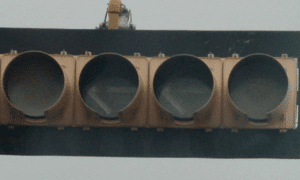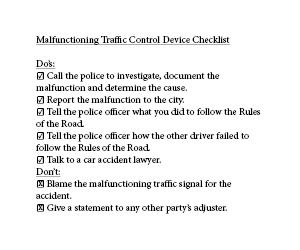What If I Was Involved in a Car Accident Due to a Malfunctioning Traffic Light?
A malfunctioning traffic light can wreak havoc on normal intersection traffic flow. Intersection collisions are often difficult enough to sort out when everything is working properly due to varying stories of drivers. However, a car wreck attorney can help determine who is liable for a car accident caused by malfunctioning traffic signal lights. This can be difficult due to the confusion regarding a driver’s duties when traffic lights malfunction. When traffic signals blackout or malfunction, the individual drivers and/or pedestrians navigating the intersection may also be liable. In some cases, the government entity (City, County, or State) are liable. These cases are often extremely difficult and often denied by insurance companies.
What Causes Traffic Light Malfunctions?
Common causes of signal light malfunction include:
- Lightning
- High winds
- Wear and tear of equipment
- Car accident damaging poles
- Power outages
- Vandals or criminals.
Sometimes the cause is unknown. However, regardless of the cause of the signal malfunction, the Rules of the Road dictate how drivers should respond to the situation.
What is the Rule When Traffic Control Devices Malfunction?
The general rule with traffic signal malfunction is that the drivers are still required to follow the rules of the road. If the light malfunction results in flashing red or yellow lights, the driver is charged with knowing that they:
- MUST stop for a flashing red light before entering the intersection and yield to cross traffic that does not stop, and;
- MAY proceed with caution only if safe to do so on a yellow light.
The Texas Transportation Code Sec. 544.008. sets this forth as follows:
FLASHING SIGNALS. (a) The operator of a vehicle facing a flashing red signal shall stop at a clearly marked stop line. In the absence of a stop line, the operator shall stop before entering the crosswalk on the near side of the intersection. In the absence of a crosswalk, the operator shall stop at the place nearest the intersecting roadway where the operator has a view of approaching traffic on the intersecting roadway. The right to proceed is subject to the rules applicable after stopping at a stop sign.
(b) The operator of a vehicle facing a flashing yellow signal may proceed through an intersection or past the signal only with caution.
(c) This section does not apply at a railroad crossing.
If you cannot see what color the light is for the cross traffic, you should assume they have right of way until you see them bring their vehicle to a complete stop at the intersection. Assuming otherwise could cause a collision that both you and the other driver may share liability for.
When all drivers have a red flashing light, this is treated as a four-way stop. (discussed more below) You must stop and proceed safely only when you have right of way to do so and it is safe to do so.
What to Do In the Event of Total Traffic Signal Blackout

When the signal is completely off or not working at all, this is called a traffic signal blackout. In the event of a traffic signal blackout, you treat the intersection as a four-way stop. When there is a four-way stop, all drivers are required to bring their vehicles to a complete stop before the intersection. Failure of any driver to do so is likely to result in a broadside collision. If there is a crosswalk, you should stop before the crosswalk. Otherwise, you should stop at any clearly marked line designating the stopping line for the intersection. In the absence of both, you should stop as close as practice without entering or blocking any part of the intersection where you can see oncoming traffic. See Texas Transportation Code 544.010.
Who Has Right of Way at a Four-Way Stop?
The general rule is that whoever arrives and stops at the intersection first has the right of way. If two or more vehicles arrive at the intersection at the same time, the vehicle on the left must yield the right-of-way to the vehicle on the right. If by chance four vehicles arrive at the same time, you had better only proceed if you are sure everyone is going to wait on you.
Liability of the Drivers for Failure to Follow Rules of the Road
The Rules of the Road are created to prevent accidents. While violation of some very obvious Rules of the Road such as “not running red lights” can be the basis of negligence per se claims, not all such violations are clear and easy to follow when traffic signals are malfunctioning. An accident caused by malfunctioning traffic signal lights often results in different people giving different versions of what happened such as both people claiming the other had the red light or duty to stop. This is what is commonly known as a “red light swearing match.”
If you can prove which driver failed to follow the able Rules of the Road, then the offending driver may be held liable. However, proving that your story is right and theirs is wrong often requires an independent eyewitness to corroborate your story. Even when you have a witness and can prove the other car did not yield, this may not alleviate your responsibility since you have a duty to keep a proper lookout at all times. Thus, when in doubt, yield the intersection to avoid being in a difficult liability situation.
Liability of the Government for Malfunctioning Traffic Lights
When an accident caused by malfunctioning traffic signal lights happens, often people want to blame the government entity responsible for the light maintenance for the accident. Proving that a government entity is liable is very difficult. Just because they put the signal up, does not mean they are liable when it malfunctions.
Governmental entities in Texas and many other states enjoy immunity from certain liabilities. A governmental entity is only liable for a malfunctioning traffic signal that they maintain when they are aware of the malfunction and fail to take reasonable steps to correct the malfunction. For example, if a report is made to a city traffic department that the signal light is out and they fail to dispatch a crew to fix the issue, then they are liable. However, if they promptly dispatch a repair crew and someone gets in a wreck before the crew can get there, the city would not be liable. Thus, blaming a malfunctioning traffic signal for causing an accident is generally not good for a plaintiff in a case.
What to Do and Not Do When You Are in an Accident Caused by a Malfunctioning Traffic Control Device
 When you are in a collision involving a malfunctioning traffic signal, it is important that you get the cause of the malfunction investigated and that you make it clear to the office that you followed the rules and the other car did not. Do not give statements to any insurance adjusters who might try to trick you into saying harmful things about your case. When you do talk to the office, do not blame the signal failure. If both drivers follow the Rules of the Road, no accident will happen. You can expect the police report to have some errors if you do not clarify that you did what the law required of you and they did not. You can also expect the other driver to tell a different story.
When you are in a collision involving a malfunctioning traffic signal, it is important that you get the cause of the malfunction investigated and that you make it clear to the office that you followed the rules and the other car did not. Do not give statements to any insurance adjusters who might try to trick you into saying harmful things about your case. When you do talk to the office, do not blame the signal failure. If both drivers follow the Rules of the Road, no accident will happen. You can expect the police report to have some errors if you do not clarify that you did what the law required of you and they did not. You can also expect the other driver to tell a different story.
How to Report Malfunctioning Traffic Lights
The easiest way to report malfunctioning traffic lights no matter what City you are in is to call 3-1-1. They can redirect your call to the appropriate department from there. Some Cities have alternative ways to report the issue to the correct department faster, however, 3-1-1- is a more universal solution.
Reporting Malfunctioning Traffic Lights in Texas FAQ
Who Can I Report Malfunctioning Traffic Signals to in Austin?
In Austin you may dial 3-1-1 to report a traffic signal problem or report it directly to the Transportation and Public Works Department at 512-974-1150 or by submitting an email here.
Who Can I Report Malfunctioning Traffic Signals to in Dallas?
In Dallas the only option is to call 3-1-1.
Who Can I Report Malfunctioning Traffic Signals to in Fort Worth?
Forth Worth offers three options to report traffic signal malfunctions:
- Call 3-1-1
- Call Ft Worth Customer Service at 817-392-1234, or;
- Report the problem via the myFW app.
Who Can I Call if Traffic Signals Are Out in Houston?
While dialing 3-1-1 will get you to the right place eventually, it is not always the most direct way to report an incident in Houston. Traffic signals are controlled by different agencies in the region depending upon the jurisdiction and roadway they are located on. Most signals within the Houston city limits are operated by the City of Houston while most signals in unincorporated areas of Harris County are operated by Harris County. The Texas Department of Transportation also operates a large number of signals in the region. These agencies can be contacted regarding signal problems at the following numbers for fastest service:
- City of Houston – 311 or 713-837-0311
- Harris County – 713-881-3210
- Texas Department of Transportation – 713-802-5662
See – map of the many of the region’s signals and their associated contacts.
Who Can I Report Malfunctioning Traffic Signals to in San Antonio?
In addition to calling 3-1-1, San Antonio provide a 311SA Mobile app that drivers may report traffic signal malfunctions through as well as a customer service number: 210-207-6000.

